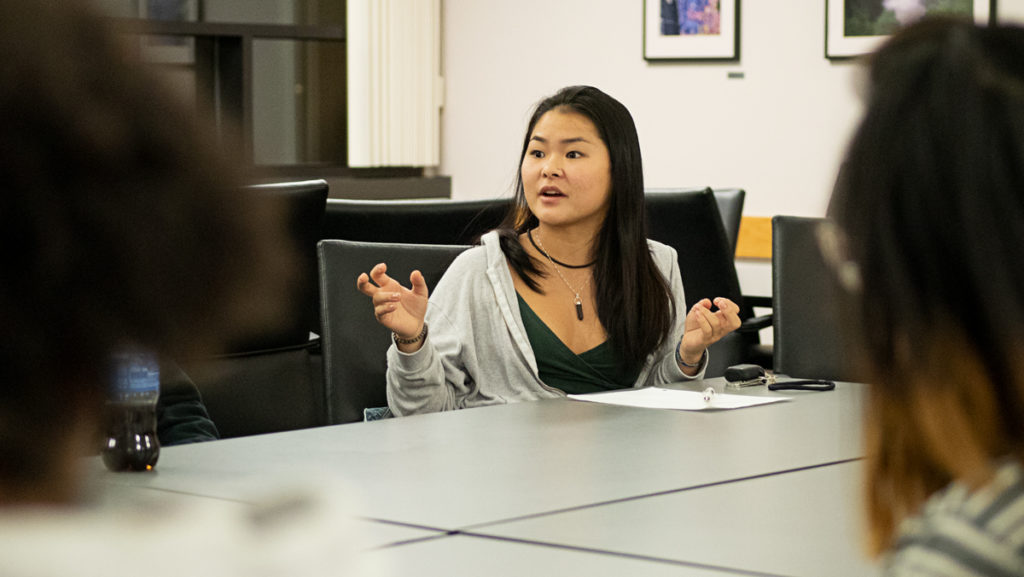Members of the Ithaca College community gathered Nov. 14 for a roundtable discussion to speak about the impacts of colonization and attending a college that is located on native land.
The event, “Being a Settler on Native Land,” was sponsored by IC Proud, Ithaca College DKA Professional Cinematic Society and the Students of Color Coalition in honor of National Indigenous Peoples Month. The month, which takes place in November, is meant to celebrate the culture, history and contributions of native people and educate the public about the challenges indigenous tribes face. Approximately 10 students, faculty and community members attended the discussion.
The college is built on Cayuga Nation land. The Cayuga and Onondaga nations, a part of the Haudenosaunee Confederacy, lived in the land that makes up Tompkins County until European colonizers destroyed their villages and forced them from their land during the Revolutionary War. As of 2018, approximately 0.3% of people in Tompkins County are of American Indian and Alaska Native descent, according to the U.S. Census Bureau. Eight students at the college are of American Indian or Alaska Native descent, according to the 2019–20 Facts in Brief.
The discussion began by exploring the idea of land acknowledgment, or the act of recognizing the traditional territories of indigenous people. Freshman Shayna Yasunaga said land acknowledgment is an important first step to respecting indigenous people, but acknowledgment alone is not enough.
“It’s a mutual level of respect for the land that you’re standing on, the land that you’re rooted on,” she said. “It’s not just acknowledging. It’s a lifestyle and it’s a culture that we are living in. We have to have respect about who we are, where we are and the history behind the soil that we are on right now.”
Junior Luis Valderrama, co-president of IC Proud, said land acknowledgment is a way to open up discussions about the other challenges indigenous tribes face.
“I think that land acknowledgments are really important, but also no structural problem can be solved by just one thing,” they said. “This is meant to recognize and bring attention to a much larger historical structural problem.”
The group also explored the topic of what it means to be indigenous and the idea of where home is.
Rowan Larkin ’19, administrative assistant in the Office of the Provost, said the Students of Color Coalition, a newly formed student organization to create unity among students of color and the Ithaca community, wanted to frame the discussion of living on indigenous land through the eyes of a person of color.
“A lot of times, examining your role as someone who lives on indigenous lands can be a hard thing for people of color, especially, to navigate because some people have ancestors who were brought here forcibly and some have family who immigrated here,” Larkin said. “We all have different relationships to the land.”
Yasunaga said that being on indigenous land has given her conflicting feelings.
“Oftentimes, we don’t even remember where we come from, not just mentally or emotionally, but physically,” Yasunaga said. “I kind of feel like a hypocrite for being a part of my culture but not a part of culture, so moving here on indigenous land is even further from who I am.”
Members of the discussion suggested supporting indigenous artists, performers and musicians by buying native artwork, music and crafts as a way to encourage and recognize the local impact of indigenous groups.
Valderrama said the conversation made them think more about their existence and identity.
“I think this whole conversation just makes me think a lot about all of the pain and suffering that had to happen for me to be here in this moment,” they said. “It is very painful and uncomfortable to think about, but is also something that I need to acknowledge and that I can’t just erase “
Yasunaga said she was surprised by what she had in common with other members at the discussion.
“I think being able to talk about it is refreshing,” she said. “I’ve never met these people in my life, but I can connect with them in ways that I didn’t really recognize.”








